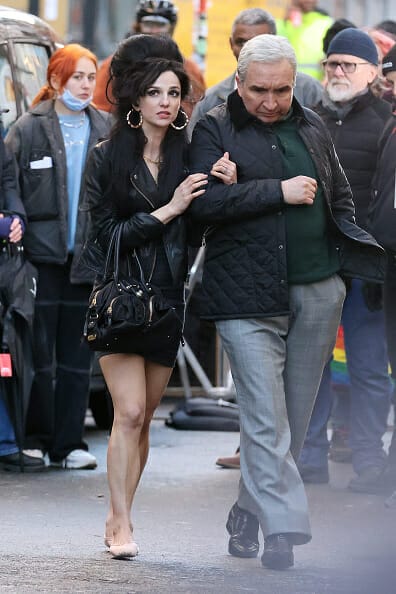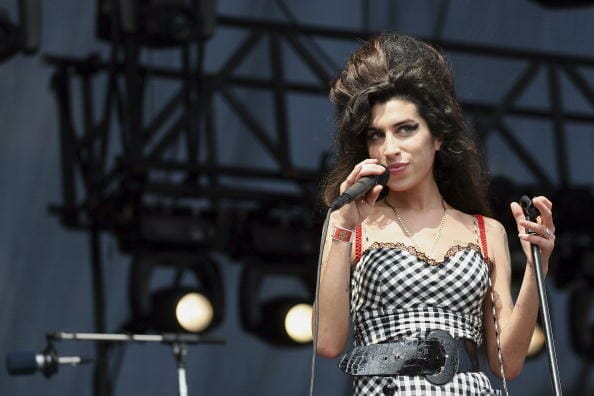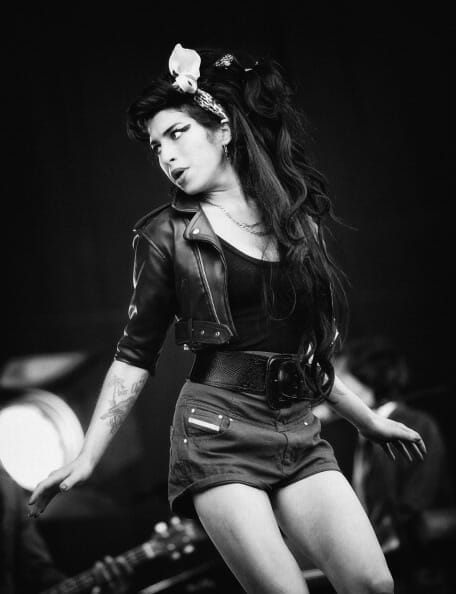
Studio Canal
Words by Marie-Claire Chappet
The real story the biopic will tackle – and the controversies it may not
After years of speculation and debate, the Amy Winehouse biopic is officially en route. In fact, it has a lead, in Industry star Marisa Abela, whose transformation into the singer was revealed in a first look earlier this month (above) – complete with iconic beehive and heavy winged eyeliner. Production has already started in London, but what will the film, about the controversial and tragic life of its eponymous star, likely cover?
What do we know about the film so far?
Ever since Asif Kapadia’s Oscar-winning documentary Amy debuted in 2015, there has been speculation as to when – or even if – a biopic of Amy Winehouse would arrive (there was even talk of Hollywood star Noomi Rapace signing on to play her that same year). The singer, who heartbreakingly died aged 27 in 2011, certainly led a life full of enough incident, drama and tragedy to pack a feature film, but many, including her fans, have said that her legacy should remain untouched – especially due to the controversy around her later years, much of which was discussed in Kapadia’s documentary.
Nevertheless, a biopic is now officially in the works, with a release from producers Studio Canal, who are partnering with Focus Features and Monumental Pictures, stating that filming started on Monday 16 January in London. Whatever disquiet there has been around the ethics of making the film, the pedigree of those involved is certainly impressive. The biopic, titled Back to Black, after Winehouse’s most iconic album (which posthumously briefly became the bestselling album of the 21st century) will be directed by acclaimed artist and filmmaker Sam Taylor-Johnson. She will be reuniting with writer Matt Greenhalgh, with whom she collaborated on 2009’s Nowhere Boy – another biopic of an iconic musical legend who died too soon: John Lennon.

Neil Mockford / Getty Images

Neil Mockford / Getty Images
The cast
Finding the right actress to portray Amy Winehouse is no mean feat, and Back to Black’s choice in Marisa Abela will mark the first major lead for the young British actress. Her star turn in BBC’s Industry, as the ambitious intern Yasmin, made her one of the most exciting young British stars to watch. She will next be seen in Greta Gerwig’s Barbie, this summer. Crucially, she is also, like Winehouse, of Jewish descent – something the production team will likely have looked for – and she also has musical experience. The RADA graduate and Londoner announced the news on her Instagram last week with a photo of her posing in front of an Amy Winehouse mural in Camden, saying, “And for London. This is for London. Cause Camden Town ain’t burnin down” – a reference to Winehouse’s acceptance speech at the 2008 Grammy’s.
Jack’O’Connell – best known for his roles in Skins, Godless and, most recently, Lady Chatterley’s Lover – stars opposite Abela as Winehouse’s husband Blake Fielder-Civil, and has already been seen on set shooting scenes in central London. The actor Eddie Marsan plays the singer’s father, Mitch Winehouse, while The Crown star Lesley Manville is also expected to join the cast.
What will the film cover?
According to a statement from the production companies, released last Friday, Back to Black will focus on: “Amy’s extraordinary genius, creativity and honesty that infused everything she did. A journey that took her from the craziness and colour of ’90s Camden High Street to global adoration, and back again, Back to Black crashes through the looking glass of celebrity to watch this journey from behind the mirror, to see what Amy saw, to feel what she felt.”
It is expected that Back to Black will therefore cover Amy’s beginnings in Camden, her rise through London’s jazz club scene, her early success with first album Frank and the stratospheric heights she reached with her second, Back To Black – from record-breaking Grammy wins to devastating media harassment. It will also undoubtedly reflect on the addictions which plagued her later years; her declining health, her rocky relationship with husband Blake Fielder-Civil and her tragically early death from alcohol poisoning.

Roger Kisby / Getty Images
It was immediately obvious she wasn’t just ’talent’… she was genius
The subject matter is evidently close to Sam Taylor Johnson’s heart, and her statement on the film pledges a fidelity and respect to Amy’s story. “My connection to Amy began when I left college and was hanging out in the creatively diverse London borough of Camden,” she said. “I got a job at the legendary KOKO Club, and I can still breathe every market stall, vintage shop and street. I first saw her perform at a talent show at Ronnie Scott’s Jazz Club in Soho and it was immediately obvious she wasn’t just ’talent’… she was genius. As a filmmaker you can’t really ask for more.
“I feel excited and humbled to have this opportunity to realise Amy’s beautifully unique and tragic story to cinema accompanied by the most important part of her legacy – her music. I am fully aware of the responsibility, and with my writing collaborator – Matt Greenhalgh – I will create a movie that we will all love and cherish forever. Just like we do Amy.”

Fred Duval / Getty Images
What it may not…
Back to Black has the full backing of the Amy Winehouse estate, and therefore it seems unlikely that the film will tackle many of the controversies surrounding Amy’s father, which were raised by Kapadia’s 2015 documentary. Questions were raised around the time of her death, and highlighted extensively in the 2015 film, focusing on Mitch Winehouse’s responsibility to his daughter’s welfare and how much he was culpable for forcing her on stage when she should have received medical assistance. It is with a sad irony that one of Winehouse’s most famous and popular songs, Rehab, is about this very dilemma: if my daddy thinks I’m fine…
Mitch Winehouse was immensely critical of the 2015 documentary. “They are trying to portray me in the worst possible light,” he told The Guardian at the time, about the film’s unflinching portrayal of his insistence that Amy keep performing, and his belief that she didn’t need to go to rehab. He never sought legal action against the film, and admitted that, although the documentary made him appear money grabbing and uncaring, his crime was most probably just an inability to deal with, and properly understand, Amy’s addictions. He now runs The Amy Winehouse Foundation, which deals with helping young people with, among other things, addiction.
Eight years on from Kapadia’s film, and the first maelstrom of accusations against Mitch, it remains to be seen how Sam Taylor Johnson will tackle his role in Amy’s life. It may once again prove the sticking point of Amy’s story – by the nature of its inclusion or omission.

Jason Squires / Getty Images
What is the true story behind the biopic?
Amy Winehouse was born in 1983 in North London to parents Mitch and Janis Winehouse. Growing up, she was heavily influenced by jazz. Most of her maternal uncles were professional jazz musicians and her paternal grandmother, a singer, had once dated the legendary English jazz artist Ronnie Scott, founder of the eponymous club in Soho. As a teenager, she attended the Sylvia Young Theatre School and, in 2002, aged 19, she was signed to 19 Management, run by Simon Fuller, the man famous for managing the Spice Girls.
In 2003, her first album Frank, was a critical, if not globally commercial, success. It was nominated for the Brit Awards, her song ‘Stronger than Me’ won the 2004 Ivor Novello Award, and the album was shortlisted for the Mercury Music Prize. Despite these elite plaudits, it would be her 2006 second album, Back to Black, which would make her an international superstar. It became the bestselling UK album of 2007 and won Winehouse five Grammys – the most ever received by a British female act.
It was the unprecedented fame which her second album brought her, which made all the difference. It coincided with the heyday of tabloid and gossip magazines in the mid noughties; and the paparazzi hounded Winehouse as she was in the throes of addiction and a stormy relationship with her husband Blake Fielder-Civil, who was quoted as saying that he introduced his wife to crack-cocaine and heroin. During this time, images of Winehouse in dirty clothes and blood-stained ballet pumps outside Camden pubs, became a staple of the tabloids. The harassment was so intense that the singer successfully applied for an injunction against a leading paparazzi agency.
The singer’s later years were filled with a string of highly-publicised disastrous performances, including one at the 2008 Glastonbury Festival during which she accosted a fan in the audience. She appeared often unfocused, under the influence or distressed, leading to many calls for her to stop working and seek help. Though she claims to have quit drugs in 2008, her alcohol dependency would prove to be an enduring issue. On 23 July 2011, she was found dead in her Camden flat from alcohol poisoning. She was just 27 years old.
In 2003, her first album Frank, was a critical, if not globally commercial, success. It was nominated for the Brit Awards, her song ‘Stronger than Me’ won the 2004 Ivor Novello Award, and the album was shortlisted for the Mercury Music Prize. Despite these elite plaudits, it would be her 2006 second album, Back to Black, which would make her an international superstar. It became the bestselling UK album of 2007 and won Winehouse five Grammys – the most ever received by a British female act.
It was the unprecedented fame which her second album brought her, which made all the difference. It coincided with the heyday of tabloid and gossip magazines in the mid noughties; and the paparazzi hounded Winehouse as she was in the throes of addiction and a stormy relationship with her husband Blake Fielder-Civil, who was quoted as saying that he introduced his wife to crack-cocaine and heroin. During this time, images of Winehouse in dirty clothes and blood-stained ballet pumps outside Camden pubs, became a staple of the tabloids. The harassment was so intense that the singer successfully applied for an injunction against a leading paparazzi agency.
The singer’s later years were filled with a string of highly-publicised disastrous performances, including one at the 2008 Glastonbury Festival during which she accosted a fan in the audience. She appeared often unfocused, under the influence or distressed, leading to many calls for her to stop working and seek help. Though she claims to have quit drugs in 2008, her alcohol dependency would prove to be an enduring issue. On 23 July 2011, she was found dead in her Camden flat from alcohol poisoning. She was just 27 years old.

Ross Gilmore / Getty Images
This article originally appeared in harpersbazaar.com



